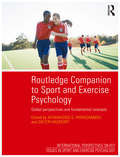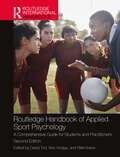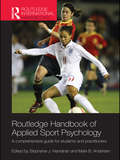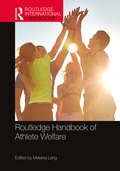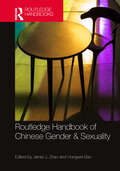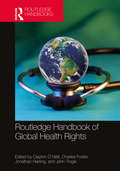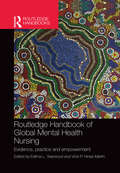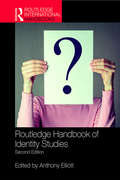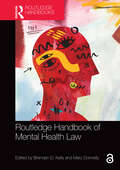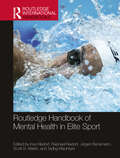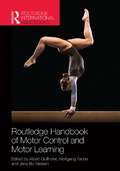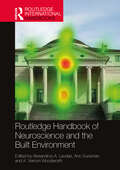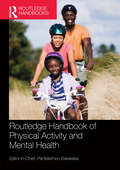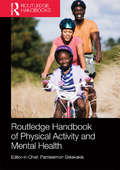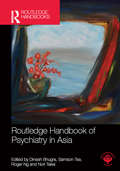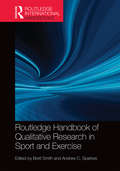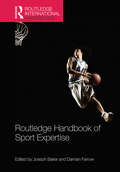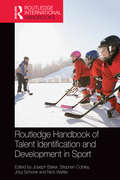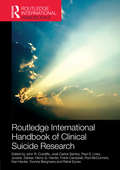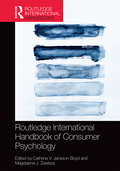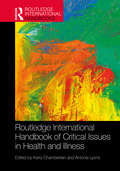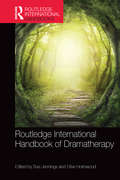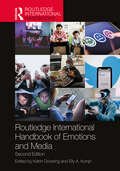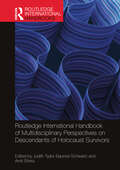- Table View
- List View
Routledge Companion to Sport and Exercise Psychology: Global perspectives and fundamental concepts (Key Issues in Sport and Exercise Psychology)
by Dieter Hackfort Athanasios G. PapaioannouWritten by an international team of expert contributors, this unique global and authoritative survey explores in full but accessible detail the basic constructs and concepts of modern sport and exercise psychology and their practical application. The book consists of 62 chapters, written by 144 contributors, deriving from 24 countries across the world. The chapters are arranged in nine cohesive sections: sport and exercise participants; the influence of environments on sport and exercise; motor skills; performance enhancement; building and leading teams; career, life skills and character development; health and well-being enhancement; clinical issues in sport psychology; and professional development and practice. Each chapter contains chapter summaries and objectives, learning aids, questions, exercises and references for further reading. Its comprehensive scale and global reach make this volume an essential companion for students, instructors and researchers in sport science, sport and exercise psychology, psychology, and physical education. It will also prove invaluable for coaches and health education practitioners.
Routledge Handbook of Applied Sport Psychology: A Comprehensive Guide for Students and Practitioners (Routledge International Handbooks)
by David TodApplied sport psychology knowledge has advanced rapidly in recent years. Traditionally, literature focused primarily on a narrow range of topics associated with performance enhancement, giving rise to a model of helping labelled psychological skills training. Although the psychological skills training model has considerable value, the literature has broadened to address a greater diversity of athlete and team issues; a greater range of methods; and a greater recognition of the knowledge, skills, and attributes practitioners need to help clients. The first edition of the Routledge Handbook of Applied Sport Psychology was seminal work, bringing together the full range of knowledge and skills sport psychology practitioners needed to help clients. The second edition continues that vision and draws on the full range of related disciplines, including sport and exercise psychology, clinical psychology, and counselling psychology. This comprehensive range of topics provides professionals what they need to build strong relationships with athletes and enhance clients’ performance, mental health, well-being, happiness, and meaning in life. This new volume is the guide to the theory and practice of applied sport psychology. Adopting a holistic definition of the role of the sport psychology practitioner, it introduces the most effective tools and skills that sport psychology practitioners need to help their clients and explains how effective counselling, assessment, and therapeutic models add necessary dimensions to professional practice. This book is divided into seven thematic sections, addressing: • Counselling • Assessment • Theoretical and therapeutic models • Psychosocial issues presenting in individual athletes • Psychosocial issues presenting in teams • Inclusion in sport psychology • Mental skills interventions
Routledge Handbook of Applied Sport Psychology: A Comprehensive Guide for Students and Practitioners (Routledge International Handbooks)
by Mark B. Andersen Stephanie J. HanrahanNow available in paperback, the Routledge Handbook of Applied Sport Psychology is a definitive guide to the theory and practice of applied sport psychology. It goes further than any other book in surveying the full variety of issues that practising sport psychologists will confront in their working lives. It introduces the most important tools and skills that psychologists will need to be truly helpful to their clients, and it also adopts a holistic definition of the role of the sport psychologist, explaining how effective counseling, assessment, and therapeutic models can add important extra dimensions to professional practice. The book is divided into seven thematic sections, addressing: counseling; assessment; theoretical and therapeutic models; issues for the individual athlete, from injury and overtraining to depression; issues for teams, from conflict resolution to travel; working with special populations; mental skills, such as imagery, goal setting, and concentration. Moving beyond the traditional tracks of clinical psychology and performance enhancement, the authors in this book argue convincingly that psychologists would benefit from attempting to understand athletes’ social and familial contexts, their health, happiness, and interpersonal dynamics in the broadest sense, if they are to serve their clients’ best interests. With contributions from many of the world’s leading sport psychologists, and with clear descriptions of best practice in each chapter, the Routledge Handbook of Applied Sport Psychology is essential reading for all serious students and practitioners of sport psychology, counseling, applied sport science, health psychology, and related fields.
Routledge Handbook of Athlete Welfare (Routledge International Handbooks)
by Melanie LangAthlete welfare should be of central importance in all sport. This comprehensive volume features cutting-edge research from around the world on issues that can compromise the welfare of athletes at all levels of sport and on the approaches taken by sports organisations to prevent and manage these. In recent years, sports organisations have increased their efforts to ensure athlete health, safety, and well-being, often prompted by high-profile disclosures of sexual, physical, and emotional abuse; bullying; discrimination; disordered eating; addiction; and mental health issues. In this book, contributors lift the lid on these and other issues that jeopardise the physical, emotional, psychological, social, and spiritual welfare of athletes of all ages to raise awareness of the broad range of challenges athletes face. Chapters also highlight approaches to athlete welfare and initiatives taken by national and international sport organisations to provide a safer, more ethical sports environment. As the first book to focus exclusively on athlete welfare, this is an essential read for students and researchers in sports studies, coaching, psychology, performance, development and management, and physical education. It is also a useful reference point for anyone working in welfare, safeguarding, child protection, and equity and inclusion in and beyond sport.
Routledge Handbook of Chinese Gender & Sexuality
by Jamie J. Zhao and Hongwei BaoThis Handbook offers a rich survey of topics concerning historical, modern and contemporary Chinese genders and sexualities.Exploring gender and sexuality as key dimensions of China’s modernisation and globalisation, this Handbook effectively situates Chinese gender and sexuality in transnational and transcultural contexts. It also spotlights nonnormative practices and emancipatory potentials within mainstream, heterosexual-dominated and patriarchally structured settings. It serves as a definitive study, research and resource guide for emerging gender and sexuality issues in the Chinese-speaking world. This Handbook covers interdisciplinary methodologies, perspectives and topics, including: History Literature Art Fashion Migration Translation Sex and desire Film and television Digital media Star and fan cultures Fantasies and lives of women and LGBTQ+ groups Social movements Transnational feminist and queer politics Paying acute attention to nonnormative genders and sexualities and emphasising the intersectionality of gender, sexuality, nationality, ethnicity and class, this Handbook offers an essential, field-defining text to Chinese gender and sexuality studies.
Routledge Handbook of Global Health Rights
by Clayton Ó Néill, Charles Foster, Jonathan Herring, and John TingleThis book examines the idea of a fundamental entitlement to health and healthcare from a human rights perspective. The volume is based on a particular conceptual reasoning that balances critical thinking and pragmatism in the context of a universal right to health. Thus, the primary focus of the book is the relationship or contrast between rights-based discourse/jurisprudential arguments and real-life healthcare contexts. The work sets out the constraints that are imposed on a universal right to health by practical realities such as economic hardship in countries, lack of appropriate governance, and lack of support for the implementation of this right through appropriate resource allocation. It queries the degree to which the existence of this legally enshrined right and its application in instruments such as the International Covenant on Economic, Social and Cultural Rights (ICESCR) and the Universal Declaration of Human Rights (UDHR) can be more than an ephemeral aspiration but can, actually, sustain, promote, and instil good practice. It further asks if social reality and the inequalities that present themselves therein impede the implementation of laudable human rights, particularly within marginalised communities and cadres of people. It deliberates on what states and global bodies do, or could do, in practical terms to ensure that such rights are moved beyond the aspirational and become attainable and implementable. Divided into three parts, the first analyses the notion of a universal inalienable right to health(care) from jurisprudential, anthropological, legal, and ethical perspectives. The second part considers the translation of international human rights norms into specific jurisdictional healthcare contexts. With a global perspective it includes countries with very different legal, economic, and social contexts. Finally, the third part summarises the lessons learnt and provides a pathway for future action. The book will be an invaluable resource for students, academics, and policymakers working in the areas of health law and policy, and international human rights law.
Routledge Handbook of Global Mental Health Nursing: Evidence, Practice and Empowerment
by Edilma Yearwood Vicki Hines-MartinAwarded second place in the 2017 AJN Book of the Year Awards in Psychiatric and Mental Health Nursing. "I welcome, at long last, a book on global mental health targeted to nurses, the front-line health worker for billions of people around the world. The roles that nurses can, and should, play in mental health care are diverse and this book addresses both well-trod as well as emerging concerns across the continuum of care from promotion to prevention to treatment. Importantly, at the heart of this diversity is the foundation of compassion and care, the hallmark of the nursing profession." – Vikram Patel, Professor of International Mental Health and Wellcome Trust Principal Research Fellow in Clinical Science, Centre for Global Mental Health, London School of Hygiene and Tropical Medicine, UK Psychiatric disorders have consistently been identified as serious and significant global burdens of disease, yet meeting the needs of people in mental distress has not often been a priority in health care. This important reference work sets out the knowledge base for understanding the state of mental health care globally, and translating that into effective practice. The Handbook provides a historical and contemporary context of mental health care, identifies and discusses evidence-based standards of care and strategies for mental health promotion and explores the need to deliver care from interdisciplinary and community-based models, placing these imperatives within a human rights and empowerment framework. It is made up of four core sections which look at: Key and emerging issues that affect global mental health practice and research, including the social context of health; Evidence-based health promotion strategies for major areas of practice internationally; A range of country studies, reflecting different problems and approaches to mental health and mental health care internationally; and What constitutes empowering practice. The only comprehensive work looking at global perspectives on mental health nursing, this is an invaluable reference for all students, academics and professionals involved in mental health research with an interest in global or cross-cultural issues.
Routledge Handbook of Identity Studies: 2nd edition (Routledge International Handbooks)
by Anthony ElliottIn this comprehensive, accessible handbook, acclaimed social theorist Anthony Elliott brings together internationally distinguished and emergent scholars in the social sciences and humanities to review the major theoretical traditions, trends and trajectories in the hugely popular field of identity studies. The Routledge Handbook of Identity Studies set new standards for reference works when first published, such was the far-reaching sweep of topics discussed – including identity studies reconfigured by feminism, post-structuralism and postmodernism, individualization theories, media and cultural studies, race and ethnicity, consumerism, environmentalism, post-colonialism, globalization and many more. This second edition of the handbook contains new contributions, including an updated general introduction from Anthony Elliott on the fast-changing conditions and contours of identity transformations in the global age. There are also new chapters on the emergence of posthuman identities - with specific focus on the global consequences of biotechnology, biomedicine, robotics and artificial intelligence for the analysis of identity - and on identity mobilities. The handbook's clear and accessible format will appeal to a wide undergraduate audience, as well as researchers and teachers, in the social sciences and humanities.
Routledge Handbook of Mental Health Law (Routledge Handbooks in Law)
by Brendan D. Kelly and Mary DonnellyMental health law is a rapidly evolving area of practice and research, with growing global dimensions. This work reflects the increasing importance of this field, critically discussing key issues of controversy and debate, and providing up-to-date analysis of cutting-edge developments in Africa, Asia, Europe, the Americas, and Australia. This is a timely moment for this book to appear. The United Nations’ Convention on the Rights of Persons with Disabilities (2006) sought to transform the landscape in which mental health law is developed and implemented. This Convention, along with other developments, has, to varying degrees, informed sweeping legislative reforms in many countries around the world. These and other developments are discussed here. Contributors come from a wide range of countries and a variety of academic backgrounds including ethics, law, philosophy, psychiatry, and psychology. Some contributions are also informed by lived experience, whether in person or as family members. The result is a rich, polyphonic, and sometimes discordant account of what mental health law is and what it might be. The Handbook is aimed at mental health scholars and practitioners as well as students of law, human rights, disability studies, and psychiatry, and campaigners and law- and policy-makers.
Routledge Handbook of Mental Health Law (Routledge Handbooks in Law)
by Brendan D. Kelly and Mary DonnellyMental health law is a rapidly evolving area of practice and research, with growing global dimensions. This work reflects the increasing importance of this field, critically discussing key issues of controversy and debate, and providing up-to-date analysis of cutting-edge developments in Africa, Asia, Europe, the Americas, and Australia.This is a timely moment for this book to appear. The United Nations’ Convention on the Rights of Persons with Disabilities (2006) sought to transform the landscape in which mental health law is developed and implemented. This Convention, along with other developments, has, to varying degrees, informed sweeping legislative reforms in many countries around the world. These and other developments are discussed here. Contributors come from a wide range of countries and a variety of academic backgrounds including ethics, law, philosophy, psychiatry, and psychology. Some contributions are also informed by lived experience, whether in person or as family members. The result is a rich, polyphonic, and sometimes discordant account of what mental health law is and what it might be.The Handbook is aimed at mental health scholars and practitioners as well as students of law, human rights, disability studies, and psychiatry, and campaigners and law- and policy-makers.
Routledge Handbook of Mental Health in Elite Sport (Routledge International Handbooks)
by Jürgen Beckmann Scott B. Martin Insa Nixdorf Raphael Nixdorf Tadhg MacIntyreMental health is a rapidly increasing topic in the field of sport psychology. As the relevance of athletes’ mental health has come to prominence through emerging research, there is a high demand for evidence-based practice in order to promote athletes' mental health and prevent mental disorders as well as maladaptive syndromes. However, there is currently no comprehensive overview available that highlights the empirical evidence for the constructs of mental health, illustrating the latest developments in research, or that highlights implications for future science and practice. The Routledge Handbook of Mental Health in Elite Sport delivers such an understanding and overview for this field, offering students, researchers, mental health professionals, applied sport psychologists, and coaches a state-of-the-art and insightful summary of science in the newly emerged field of clinical sport psychology and mental health in athletes. This thorough volume covers major current and emerging topics on mental health and mental illness (e.g., depression), subclinical syndromes (e.g., burnout), as well as a comprehensive overview of research on prevention (e.g., green exercise) and treatment of mental health disorders in athletes and will be a vital resource for researchers, academics, and students in the fields of sport psychology, clinical psychology, sport coaching, sport sciences, health psychology, and physical activity and related disciplines.
Routledge Handbook of Motor Control and Motor Learning (Routledge International Handbooks)
by Gollhofer Albert Taube Wolfgang Bo Nielsen JensThe Routledge Handbook of Motor Control and Motor Learning is the first book to offer a comprehensive survey of neurophysiological, behavioural and biomechanical aspects of motor function. Adopting an integrative approach, it examines the full range of key topics in contemporary human movement studies, explaining motor behaviour in depth from the molecular level to behavioural consequences. The book contains contributions from many of the world´s leading experts in motor control and motor learning, and is composed of five thematic parts: Theories and models Basic aspects of motor control and learning Motor control and learning in locomotion and posture Motor control and learning in voluntary actions Challenges in motor control and learning Mastering and improving motor control may be important in sports, but it becomes even more relevant in rehabilitation and clinical settings, where the prime aim is to regain motor function. Therefore the book addresses not only basic and theoretical aspects of motor control and learning but also applied areas like robotics, modelling and complex human movements. This book is both a definitive subject guide and an important contribution to the contemporary research agenda. It is therefore important reading for students, scholars and researchers working in sports and exercise science, kinesiology, physical therapy, medicine and neuroscience.
Routledge Handbook of Neuroscience and the Built Environment (Routledge International Handbooks)
by Ann Sussman A. Vernon Woodworth Alexandros A. LavdasAccording to the OECD (Organization for Economic Cooperation and Development), in the21st century, we are living in a New Age of Biology, acknowledging the rapid developmentof transformative findings in the life sciences. The Routledge Handbook of Neuroscience andthe Built Environment shows how these new findings impact architecture, planning, anddesign, changing our understanding how people respond to their surroundings, and howthese environments can be optimized for human well-being.A total of 31 chapters, presented in six sections, discuss human perception, the needfor connection, and how design impacts health and well-being, through topics such asneuroaesthetics, color, memory and place, proportion, sound, neurophenomenology,neurodiversity, biophilia, beauty, artificial intelligence, among many others. Expertinternational contributors look to answer key questions as follows: What do architects anddesigners need to know about neuroscience? How does architecture and design impact usnon-consciously? Why is acknowledging the human subliminal experience important? Whattools can designers use to “see” our subliminal behaviors?This volume will be important reading for the design community, whether practicing,educating, or studying, as well as policy makers and public health professionals.
Routledge Handbook of Physical Activity and Mental Health
by Jennifer L. Etnier Panteleimon Ekkekakis Jasper A.J. Smits Dane B. Cook Lynette L. Craft S. Nicole Culos-Reed Mark Hamer Kathleen A.Martin Ginis Justy Reed Michael UssherA growing body of evidence shows that physical activity can be a cost-effective and safe intervention for the prevention and treatment of a wide range of mental health problems. As researchers and clinicians around the world look for evidence-supported alternatives and complements to established forms of therapy (medication and psychotherapy), interest in physical activity mounts. The Routledge Handbook of Physical Activity and Mental Health offers the most comprehensive review of the research evidence on the effects of physical activity on multiple facets of mental health. Written by a team of world-leading international experts, the book covers ten thematic areas:physical activity and the ‘feel good’ effectanxiety disordersdepression and mood disordersself-perceptions and self-evaluationscognitive function across the lifespanpsychosocial stresspainenergy and fatigueaddictionsquality of life in special populations.This volume presents a balanced assessment of the research evidence, highlights important directions for future work, and draws clear links between theory, research, and clinical practice. As the most complete and authoritative resource on the topic of physical activity and mental health, this is essential reading for researchers, students and practitioners in a wide range of fields, including clinical and health psychology, psychiatry, neuroscience, behavioural and preventive medicine, gerontology, nursing, public health and primary care.
Routledge Handbook of Physical Activity and Mental Health (Routledge International Handbooks Ser.)
by Panteleimon EkkekakisA growing body of evidence shows that physical activity can be a cost-effective and safe intervention for the prevention and treatment of a wide range of mental health problems. As researchers and clinicians around the world look for evidence-supported alternatives and complements to established forms of therapy (medication and psychotherapy), interest in physical activity mounts. The Routledge Handbook of Physical Activity and Mental Health offers the most comprehensive review of the research evidence on the effects of physical activity on multiple facets of mental health. Written by a team of world-leading international experts, the book covers ten thematic areas: physical activity and the ‘feel good’ effect anxiety disorders depression and mood disorders self-perceptions and self-evaluations cognitive function across the lifespan psychosocial stress pain energy and fatigue addictions quality of life in special populations. This volume presents a balanced assessment of the research evidence, highlights important directions for future work, and draws clear links between theory, research, and clinical practice. As the most complete and authoritative resource on the topic of physical activity and mental health, this is essential reading for researchers, students and practitioners in a wide range of fields, including clinical and health psychology, psychiatry, neuroscience, behavioural and preventive medicine, gerontology, nursing, public health and primary care.
Routledge Handbook of Psychiatry in Asia
by Dinesh Bhugra Samson Tse Roger Ng Nori TakeiGeographically and demographically Asia is a huge region with a large number of societies and cultures, each affected by their own unique problems including over-population, major natural disasters, poverty and changing social and economic factors. Inevitably this means that different mental health needs have developed across the region. Colonialism, globalization, industrialization and urbanization have brought major demographic and cultural shifts in the region but clinical mental health practices and services and societal attitudes to mental health issues vary enormously. This handbook surveys the state of the current psychiatric care field across the whole Asia-Pacific region. Focusing on individual countries, each chapter will include: A summary of factors affecting the practice and provision of psychiatric care, including cultural attitudes to mental health issues Coverage of the conceptualisation, causation and prevalence of mental health issues in society An overview of mental health care services and systems available and workforce training Coverage of country specific innovative practices and folk therapies As the first major reference work on psychiatric care in Asia this book is an essential resource for scholars and students researching mental health in Asia as well as psychiatrists and other mental health professionals working in the region.
Routledge Handbook of Qualitative Research in Sport and Exercise (Routledge International Handbooks)
by Andrew C. Sparkes Brett SmithThe last two decades have witnessed a proliferation of qualitative research in sport and exercise. The Routledge Handbook of Qualitative Research in Sport and Exercise is the first book to offer an in-depth survey of established and emerging qualitative methods, from conceptual first principles to practice and process. Written and edited by a team of world-leading researchers, and some of the best emerging talents, the book introduces a range of research traditions within which qualitative researchers work. It explores the different methods used to collect and analyse data, offering rationales for why each method might be chosen and guidance on how to employ each technique successfully. It also introduces important contemporary debates and goes further than any other book in exploring new methods, concepts, and future directions, such as sensory research, digital research, visual methods, and how qualitative research can generate impact. Cutting-edge, timely and comprehensive, the Routledge Handbook of Qualitative Research in Sport and Exercise is an essential reference for any student or scholar using qualitative methods in sport and exercise-related research.
Routledge Handbook of Sport Expertise (Routledge International Handbooks)
by Joseph Baker Damian FarrowUnderstanding and developing expertise is an important concern for any researcher or practitioner working in elite or high performance sport. Whether it's identifying talented young athletes or developing methods for integrating cutting-edge sport science into daily coaching practice, scientists, coaches and researchers all need to understand the skills, characteristics, and knowledge that distinguish the expert performer in sport. The Routledge Handbook of Sport Expertise is the first book to offer a comprehensive overview of current research and practice in the emerging field of sports expertise. Adopting a multi-disciplinary, multi-faceted approach, the book offers in-depth discussion of methodological and philosophical issues in sport expertise, as well as the characteristics that describe sporting ‘experts’ and how they can be facilitated and developed. Exploring research, theory and practice, the book also examines how scientists and practitioners can work together to improve the delivery of applied sport science. With contributions from many of the world’s leading researchers in expertise and skill acquisition in sport, the Routledge Handbook of Sport Expertise is important reading for any advanced student, researcher, coach or sport science support officer looking to better understand this cutting-edge topic.
Routledge Handbook of Talent Identification and Development in Sport (Routledge International Handbooks)
by Joseph Baker Jörg Schorer Nick Wattie Stephen CobleyIdentifying athletic talent and developing that talent to its full potential is a central concern in sport. Understanding talent identification and its implications for both positive and negative developmental outcomes is crucial to sporting success. This is the first comprehensive resource for scientists, researchers, students, coaches, analysts and policymakers looking to improve their knowledge of the talent identification and development process. With contributions from leading researchers and practitioners, this book offers a complete overview of contemporary talent identification and development from in-depth discussion of methodological and philosophical issues through to practical applications. Adopting an international and multi-disciplinary approach, it addresses all key aspects of the talent identification and development process, including skill acquisition and motor learning, psychological factors and family influences, creating optimal environments for performance, and dealing with injury and rehabilitation. Presenting an unrivalled wealth of research, the Routledge Handbook of Talent Identification and Development in Sport is an essential resource for any undergraduate or postgraduate degree course in sport studies, sport science, sport coaching or sport management, as well as for sport policymakers, analysts and coaches.
Routledge International Handbook of Clinical Suicide Research
by Paul S. Links Henry G. Harder José Carlos Santos John R. Cutcliffe Juveria Zaheer Frank Campbell Rod McCormick Kari Harder Yvonne Bergmans Rahel EynanSuicide remains one of the most pressing public health concerns across the world. Expensive in terms of the human cost and associated suffering, the economic costs, the social costs and the spiritual costs, it affects millions of people every year. This important reference work collects together a wide range of research around suicide and suicide prevention, in order to guide future research and provide guidance for professionals about the best way to respond meaningfully to suicidal patients. Responding to the need for multi-disciplinary and international research to deepen our understanding of suicide, it demonstrates where our knowledge is firmly evidence-based and where new areas for research are emerging, as well as highlighting where we know little. Divided into six parts, each with its own editorial introduction and commentary, it explores research with and about survivors of suicide and indigenous populations. The remaining sections look at suicide-focused research in psychiatric nursing, psychiatry, psychology, and social work and allied health. It is of interest to all advanced students, practitioners and scholars interested in suicide and its impact and prevention.
Routledge International Handbook of Consumer Psychology (Routledge International Handbooks)
by Cathrine V. Jansson-Boyd Magdalena J. ZawiszaThis unique handbook maps the growing field of consumer psychology in its increasingly global context. With contributions from over 70 scholars across four continents, the book reflects the cross-cultural and multidisciplinary character of the field. Chapters relate the key consumer concepts to the progressive globalization of markets in which consumers act and consumption takes place.The book is divided into seven sections, offering a truly comprehensive reference work that covers: The historical foundations of the discipline and the rise of globalization The role of cognition and multisensory perception in consumers’ judgements The social self, identity and well-being, including their relation to advertising Social and cultural influences on consumption, including politics and religion Decision making, attitudes and behaviorally based research Sustainable consumption and the role of branding The particularities of online settings in framing and affecting behavior The Routledge International Handbook of Consumer Psychology will be essential reading for anyone interested in how the perceptions, feelings and values of consumers interact with the decisions they make in relation to products and services in a global context. It will also be key reading for students and researchers across psychology and marketing, as well as professionals interested in a deeper understanding of the field.
Routledge International Handbook of Critical Issues in Health and Illness (Routledge International Handbooks)
by Kerry Chamberlain and Antonia LyonsThe Routledge International Handbook of Critical Issues in Health and Illness is a multidisciplinary reference book that brings together cutting-edge health and illness topics from around the globe. It offers a range of theoretical and critical perspectives to provide contemporary insights into complex health issues that can offer ways to address inequitable patterns of illness and ill health. This collection, written by an international pool of expert academics from a range of disciplinary backgrounds, is unique in providing theoretical and critical analyses on key health topics, considering power and broader social structures that influence health and illness outcomes. The chapters are organised in three parts. The first covers medical contexts; here, chapters provide commentary and critical analysis of the history of medicine, medicalisation, pharmaceuticalisation, services and care, medical technology, diagnosis, screening, personalised medicine, and complementary and alternative medicine. The second part covers life contexts; chapters include a range of life contexts that have implications for health, including gender, sexuality, reproduction, disability, ethnicity, indigeneity, inequality, ageing, and dying. The third part covers shifting contextual domains; chapters consider contemporary areas of life that are rapidly changing, including bioethics, digital health, migration, medical travel, geography and "place", commercialisation, globalisation, and climate change. The Routledge International Handbook of Critical Issues in Health and Illness is a key contemporary reference text for scholars, students, researchers, and professionals across disciplines, including sociology, psychology, anthropology, geography, medicine, public health, and health science.
Routledge International Handbook of Dramatherapy (Routledge International Handbooks)
by Sue Jennings and Clive HolmwoodRoutledge International Handbook of Dramatherapy is the first book of its kind to bring together leading professionals and academics from around the world to discuss their practice from a truly international perspective. Dramatherapy has developed as a profession during the latter half of the twentieth century. Now, we are beginning to see its universal reach across the globe in a range of different and diverse approaches. From Australia, to Korea to the Middle East and Africa through Europe and into North & South America dramatherapists are developing a range of working practices using the curative power of drama within a therapeutic context to work with diverse and wide ranging populations. Using traditional texts in the Indian sub-continent, healing performances in the Cameroon, supporting conflict in Israel and Palestine, through traditional Comedic theatre in Italy, to adolescents in schools and adults with mental ill health, this handbook covers a range of topics that shows the breadth, depth and strength of dramatherapy as a developing and maturing profession. It is divided into four main sections that look at the current international: Developments in dramatherapy Theoretical approaches Specific practice New and innovative approaches Offering insights on embodiment, shamanism, anthropology and cognitive approaches coupled with a range of creative, theatrical and therapeutic methods, this ground breaking book is the first congruent analysis of the profession. It will appeal to a wide and diverse international community of educators, academics, practitioners, students, training schools and professionals within the arts, arts education and arts therapies communities. Additionally it will be of benefit to teachers and departments in charge of pastoral and social care within schools and colleges.
Routledge International Handbook of Emotions and Media (Routledge International Handbooks)
by Katrin Döveling Elly A. KonijnIn times of a worldwide pandemic, the election of a new US president, "MeToo," and "Fridays for Future," to name but a few examples, one thing becomes palpable: the emotional impact of media on individuals and society cannot be underestimated. The relations between media, people, and society are to a great extent based on human emotions. Emotions are essential in understanding how media messages are processed and how media affect individual and social behavior as well as public social life. Adopting a thoroughly interdisciplinary approach to the study of emotions in the context of media, the second, entirely revised and updated, edition of Routledge International Handbook of Emotions and Media comprises areas such as evolutionary psychology, media psychology, media sociology, cultural studies, media entertainment, and political and digital communication. Leading experts from across the globe explore cutting-edge research on the role of emotion in selecting and processing media contents, the emotional consequences of media use, politics and public emotion, emotions in political communication and persuasion, as well as emotions in digital, interactive, and virtual encounters. This compelling and authoritative Handbook is an essential reference tool for scholars and students of media, communication science, media psychology, emotion, cognitive and social psychology, cultural studies, media sociology, and related fields.
Routledge International Handbook of Multidisciplinary Perspectives on Descendants of Holocaust Survivors (Routledge International Handbooks)
by Amit Shrira Judith Tydor Baumel-SchwartzThe Routledge International Handbook of Multidisciplinary Perspectives on Descendants of Holocaust Survivors offers a comprehensive collection of cutting-edge studies from a wide range of fields dealing with new research about descendants of Holocaust survivors. Examining the aftermath of the Holocaust on the Second Generation and Third Generation, children and grandchildren of Holocaust survivors, it is the first volume to bring together research perspectives from history, psychology, sociology, communications, literature, film, theater, art, music, biology, and medicine. With contributions from international experts, key topics covered include survivor characteristics and experiences; the phenomenological experience of transmitted trauma legacies; the creation of Second Generation groups; the epigenetics of inherited trauma; the development of Second Generation writing; representation of Holocaust survivors in film; music and the transmission of memory; art, music, and the Holocaust; ancestral trauma and its effect on the ageing process of subsequent generations; 2G and 3G health issues and outcomes. Divided into two sections, the first deals with the humanities: history and testimony, literature, film and theater, art, and music. The second section, focusing on the social sciences and health-related sciences, contains chapters dealing with studies in the fields of psychology, sociology, anthropology, communication, gerontology, nursing, and medicine. This insightful handbook is a contemporary anthology for advanced students and scholars in the humanities, along with those in behavioral, social, and health-related sciences concerned with research about second- and third-generation Holocaust survivors.
